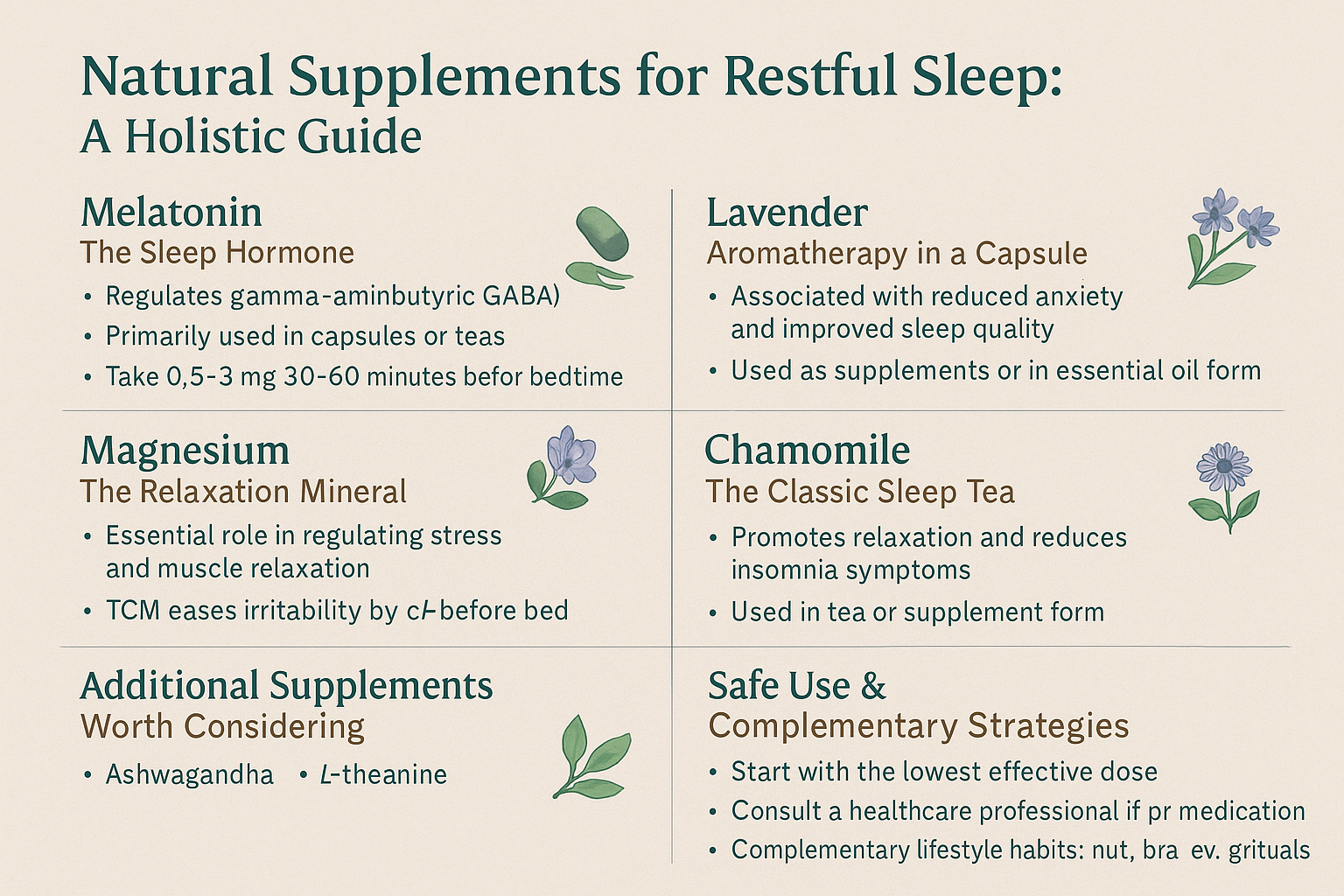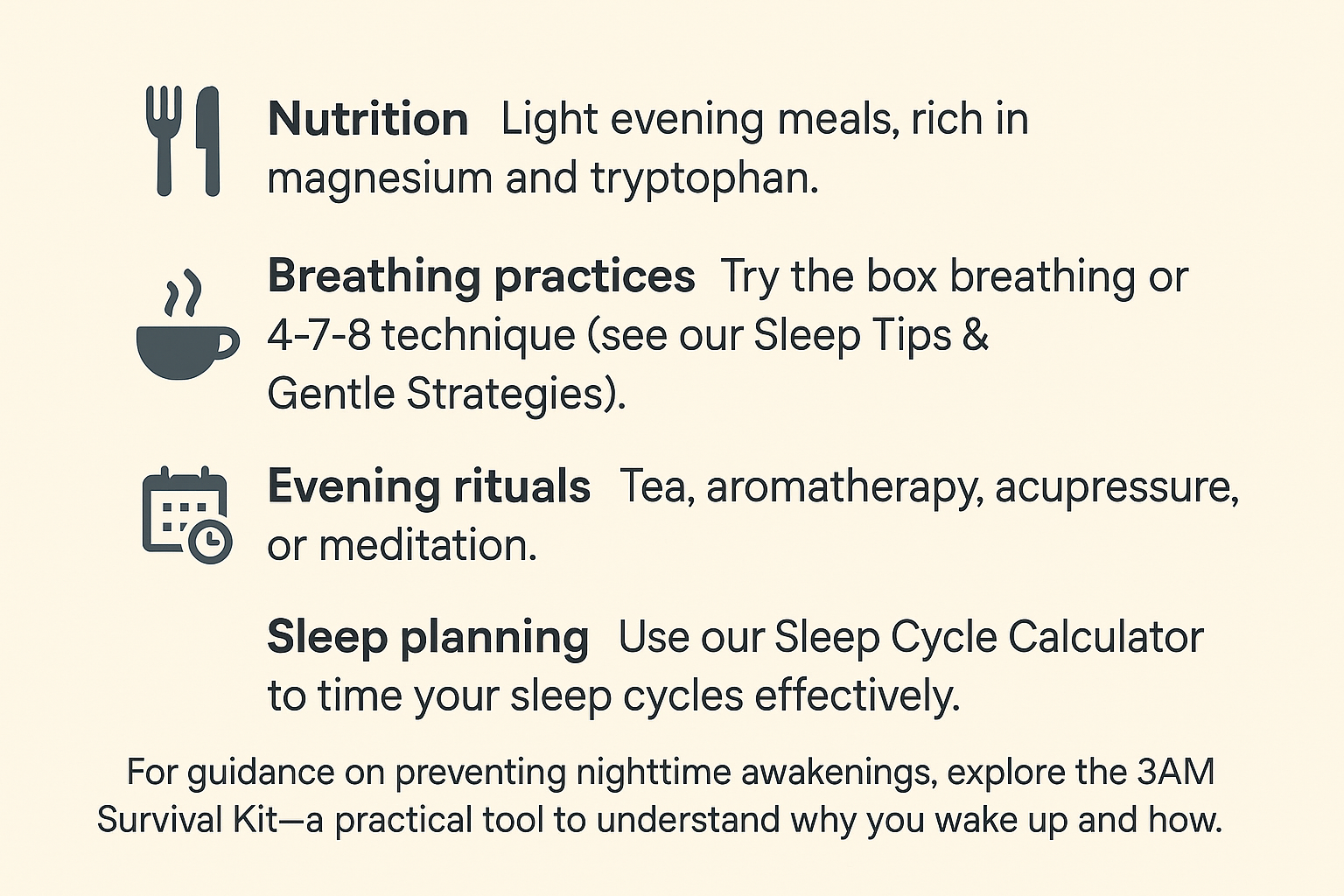Embrace Nature's Sleep Aids: Natural Supplements for Restful Nights
Published on June 28, 2025

Natural Supplements for Restful Sleep: A Holistic Guide
In our fast-paced world, achieving a restful night's sleep can sometimes feel elusive. While creating a cozy bedtime routine and optimizing your sleep environment are crucial steps, natural supplements can also play a supportive role in enhancing sleep quality. In this expanded guide, we’ll explore the most effective natural sleep aids, practical ways to use them, and complementary insights from Traditional Chinese Medicine (TCM), aromatherapy, and mindful practices such as lucid dreaming.

Melatonin: The Sleep Hormone
Melatonin is a hormone naturally produced by the pineal gland in response to darkness. It helps regulate your sleep-wake cycle, making it a popular choice for those struggling with sleep disorders or jet lag. Supplementing with melatonin can signal to your body that it's time to wind down.
- Best for: shifting time zones, irregular schedules, or delayed sleep phase.
- How to use: Take 0.5–3 mg about 30–60 minutes before bedtime. Lower doses often work better than high ones.
- TCM perspective: Melatonin aligns with the natural rhythm of Yin energy rising at night. Supporting Yin through lifestyle (warm evening teas, dim lights) enhances its effect.
For a deeper understanding of your body’s internal clock, see Understanding Circadian Rhythms: The Key to Harmonious Sleep.
Valerian Root: Nature's Tranquilizer
Valerian root has been used for centuries as a natural remedy for insomnia and anxiety. It works by increasing gamma-aminobutyric acid (GABA), a calming neurotransmitter in the brain.
- Evidence: Studies suggest valerian may reduce sleep onset time and improve sleep depth.
- Usage: Usually in capsules or teas, taken an hour before bedtime.
- Aromatherapy tip: Valerian essential oil can also be diffused, though its scent is strong and earthy.
In TCM, valerian’s calming effect resonates with the Shen (spirit) of the heart, helping restless thoughts settle into quiet.
Magnesium: The Relaxation Mineral
Magnesium is essential for stress regulation, muscle relaxation, and nervous system balance. A deficiency is linked with insomnia, restless legs, and heightened stress.
- Sources: Pumpkin seeds, leafy greens, almonds, or supplements (citrate or glycinate forms).
- Benefits: Supports melatonin production and reduces nighttime awakenings.
- Practice: Combine magnesium with mindful breathwork, such as the 4-7-8 technique (inhale 4, hold 7, exhale 8), to maximize relaxation.
For more on this topic, read Unlocking Restful Sleep: Exploring the Sleep Benefits of Magnesium and Ashwagandha.
Lavender: Aromatherapy in a Capsule
Lavender is widely recognized for its soothing properties.
- Supplements: Shown to reduce anxiety and improve sleep quality.
- Aromatherapy: Lavender essential oil in a diffuser or a few drops in a warm bath can prepare body and mind for sleep.
- TCM view: Lavender clears “excess heat” from the heart and liver, easing irritability and restlessness.
See also Embrace Aromatherapy: A Natural Path to Deeper Sleep.
Passionflower: A Calming Companion
Passionflower, often used alongside valerian, gently raises GABA levels.
- Use: As a tea or extract before bed.
- Best for: Those with racing thoughts or anxiety-driven insomnia.
- Lucid dreaming note: Some practitioners use passionflower to enhance dream vividness, making it an interesting option for those exploring conscious dreaming.
Chamomile: The Classic Sleep Tea
Chamomile has earned its reputation as a gentle sleep herb.
- Action: Contains apigenin, an antioxidant that binds to calming receptors in the brain.
- Forms: Tea, capsules, or essential oil.
- TCM link: Chamomile supports digestion and calms the liver, making it a good choice after late or heavy meals.
Additional Supplements Worth Considering
- Ashwagandha: An adaptogen that lowers cortisol and supports a calmer nervous system.
- L-theanine: Found in green tea; promotes alpha brain waves for relaxation.
- Glycine: An amino acid that may lower body temperature slightly, aiding sleep onset.
Traditional Chinese Medicine Insights
According to TCM, quality sleep depends on the balance of Yin and Yang energies and the harmony of organ systems. Certain supplements align naturally with these principles:
- Heart & Shen (Spirit): Calming herbs like valerian and passionflower soothe the Shen, helping with racing thoughts.
- Liver Qi: Chamomile and lavender ease stagnation and stress, supporting smoother energy flow.
- Kidneys: Magnesium and Yin-nourishing foods (black sesame, walnuts) replenish vital energy, preventing night waking.
For practical techniques, explore our free guide: Acupressure for Better Sleep.
Practical Ways to Combine Supplements and Rituals
| Goal | Supplement | Ritual Support |
|---|---|---|
| Faster sleep onset | Valerian, melatonin | Evening digital detox, dim lighting |
| Deeper relaxation | Magnesium, lavender | Warm bath with lavender oil |
| Calming a racing mind | Passionflower, chamomile | Journaling or meditation before bed |
| Hormonal balance | Ashwagandha, magnesium | Gentle yoga or Qigong |
Safe Use & Considerations
- Always start with the lowest effective dose.
- Avoid mixing multiple sedative herbs at high doses.
- Consult a healthcare professional if pregnant, nursing, or taking medication.
Complementary Strategies
Supplements work best alongside lifestyle habits:
- Nutrition: Light evening meals, rich in magnesium and tryptophan.
- Breathing practices: Try the box breathing or 4-7-8 technique (see our Sleep Tips & Gentle Strategies).
- Evening rituals: Tea, aromatherapy, acupressure, or meditation.
- Sleep planning: Use our Sleep Cycle Calculator to time your sleep cycles effectively.
For guidance on preventing nighttime awakenings, explore the 3AM Survival Kit—a practical tool to understand why you wake up and how to gently return to sleep.

Conclusion
Incorporating natural supplements into your sleep routine can be a gentle and effective way to enhance sleep quality. But the real secret lies in a holistic approach—balancing science, ancient wisdom, and mindful daily practices.
By embracing the power of nature and harmonizing body and mind, you can guide yourself into more restful, restorative nights. And if you’d like to deepen your toolkit, don’t miss our free guide: Acupressure for Better Sleep.
Frequently Asked Questions
Martin Lain — Sleep Researcher & Creator of SleepCureAI
Martin Lain combines modern sleep science, circadian-rhythm research, TCM-inspired insights, and AI-based pattern analysis to help people understand their sleep more deeply. His work integrates gentle nighttime rituals, nervous system regulation, and data-driven tools.
Medically Reviewed by
Dr. Mei Lin, DACM – TCM Sleep Medicine Specialist
(Editorial Medical Reviewer Persona)
Dr. Mei Lin is an editorial medical reviewer specializing in Traditional Chinese Medicine. Her expertise focuses on the relationship between Yin–Yang balance, Shen (Heart spirit), Liver Qi regulation, and the Kidney's role in nighttime restoration. Her review ensures that SleepCureAI articles align with foundational TCM sleep principles and classical physiological patterns described in traditional sources.
- Yin deficiency and difficulty sleeping
- Liver Qi stagnation and 1–3AM wake-ups
- Kidney Yin and nighttime restoration
This reviewer profile represents an editorial medical persona used for accuracy review of TCM-related sleep concepts.
Reviewed by SleepCureAI Sleep Engine (Beta)
A machine-learning model trained on circadian rhythm science, Traditional Chinese Medicine sleep physiology, and behavioral sleep optimization frameworks. This system reviews each article for timing accuracy, emotional–physiological coherence, and alignment with safe sleep practices.
- Circadian rhythm consistency
- Nervous system safety & regulation insights
- TCM coherence (Yin–Yang, Liver Qi, Shen)
- Evidence-based lifestyle recommendations
Disclaimer: This AI system does not diagnose medical conditions and does not replace professional care.